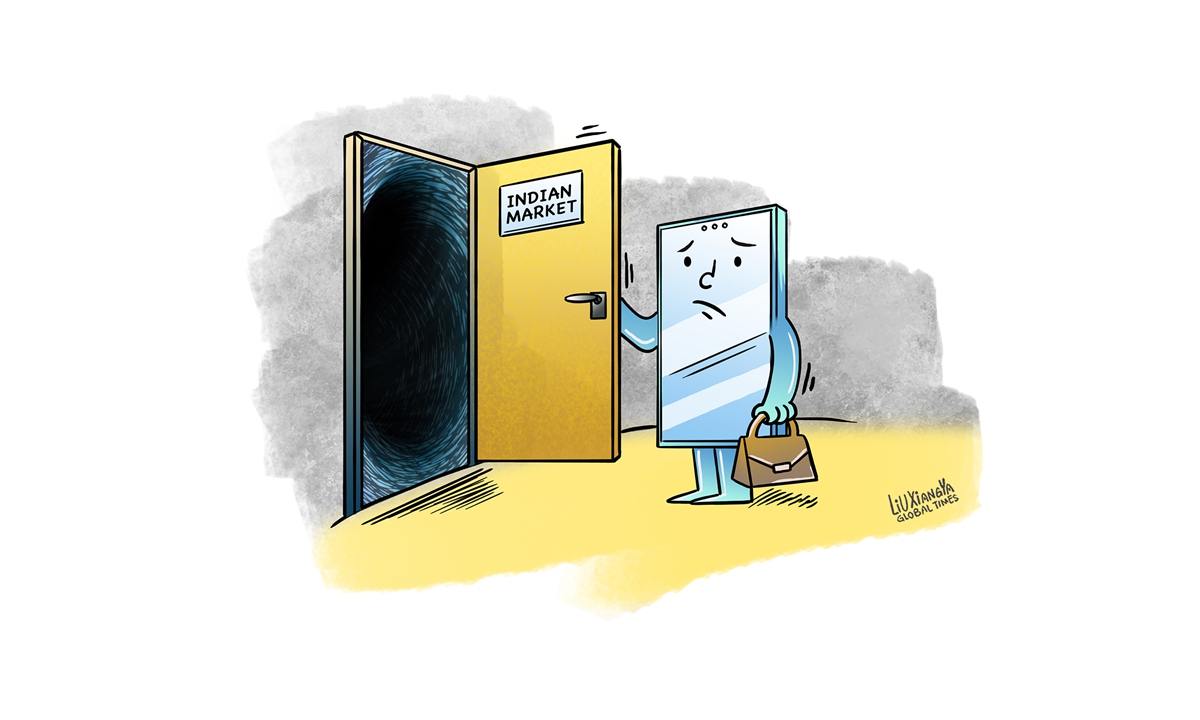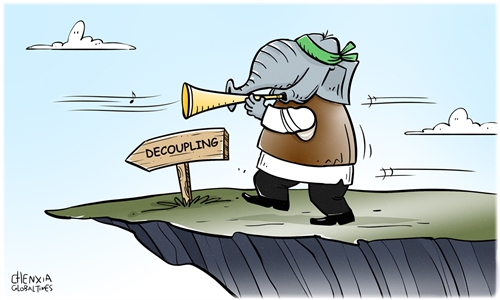
Illustration: Liu Xiangya/Global Times
It is ironic that while Indian manufacturers are eagerly awaiting their chance to work with Chinese enterprises, the South Asian country, once a sound investment destination to build an outsourcing base, is facing a crisis of trust caused by its intensified crackdown on Chinese smartphone makers such as Xiaomi and Vivo.As reported by Indian media outlets, Indian manufacturers such as Lava and Bhagwati (Micromax) are struggling to meet their incremental targets under the Indian government's production-linked incentive (PLI) program for the third consecutive year in fiscal year 2024, underlining challenges in the government's efforts to create local manufacturing champions.
Bhagwati has been unable to get large orders from Chinese smartphone brands despite government support due to factors such as limited capacity, the Business Standard reported on Tuesday. Earlier this year, Bhagwati was reportedly in talks with Chinese brands to manufacture smartphones in India.
It is understandable India hopes its manufacturing sector can become an engine for economic growth and jobs. However, the country is undergoing a crisis of trust as the media is constantly abuzz with reports of arresting industry executives or imposing hefty fines. In the latest example, Indian media reports said that law-enforcement agencies on Tuesday arrested four industry executives, including an employee of the Chinese smartphone manufacturer Vivo, in a case of alleged money laundering.
Despite some progress, India remains a challenging place to do business. New protectionist measures, backward infrastructure and Indian-specific standards not aligned with international standards effectively closed off manufacturers from global supply chains and restricted any expansion in trade and investment.
More importantly, it is an alarming fact that since the border conflict between China and India in June 2020, Indian authorities have significantly increased their hostility toward Chinese companies. Chinese investors' confidence in India's business environment has been severely undermined. It is hoped that Indian officials can be made aware of the seriousness of the problem.
It is undeniable that India's growing market is attractive to Chinese smartphone makers. However, we advise India not to further undermine the confidence of Chinese enterprises in India's business environment, and stop testing their bottom line. At the very least, it is necessary to prevent the "confidence crisis" from evolving into a collapse of trust.
If manufacturers from China and India can take advantage of their economic complementarity in sectors such as smartphones and broader industrial chains, they could achieve a win-win result under which trade and investment will be expanded and help boost India's manufacturing industry, similar to what India's PLI program aims for. Regrettably, India's trade protectionism and irrational crackdowns against Chinese enterprises have hindered this process.
If India wants to achieve its ambition to become a "world factory," it will have to face the thorny issue of how to rebuild Chinese investors' confidence in India's investment environment. In regard to a trust crisis, India has entered a "red zone" where an alarm has sounded and India should turn itself around to defuse risks.
China and India have strong complementarity in trade and economic development. Although India's crackdown on Chinese firms is becoming increasingly intensified, China's exports to India increased by 5.2 percent in the first eight months of this year. A large part of this gain came from China's exports of raw materials, intermediate products, machinery and equipment to India.
Indian media reports said the country exported smartphones worth $4.67 billion in April-July this fiscal year, of which the US accounted for one-third in value terms. If people in India regard this as something to boast about, they should realize that Asian countries now are center stage in global manufacturing, creating a regional cluster of supply chains.
As such, the vast majority of Apple suppliers are located in Asia, or more specifically - China. If India wants to make itself a smartphone manufacturing base and create local manufacturing champions, it needs cooperation with Chinese brands under the PLI program as well as Chinese investment, intermediate products, machinery and equipment. That's why Chinese companies' business confidence in India is important for the South Asian country.
India is playing a dangerous game to undermine Chinese companies' confidence toward the Indian market. Hopefully India can turn itself around in a timely manner to eliminate uncertainty and improve the business environment, before it's too late.
The author is a reporter with the Global Times. bizopinion@globaltimes.com.cn



